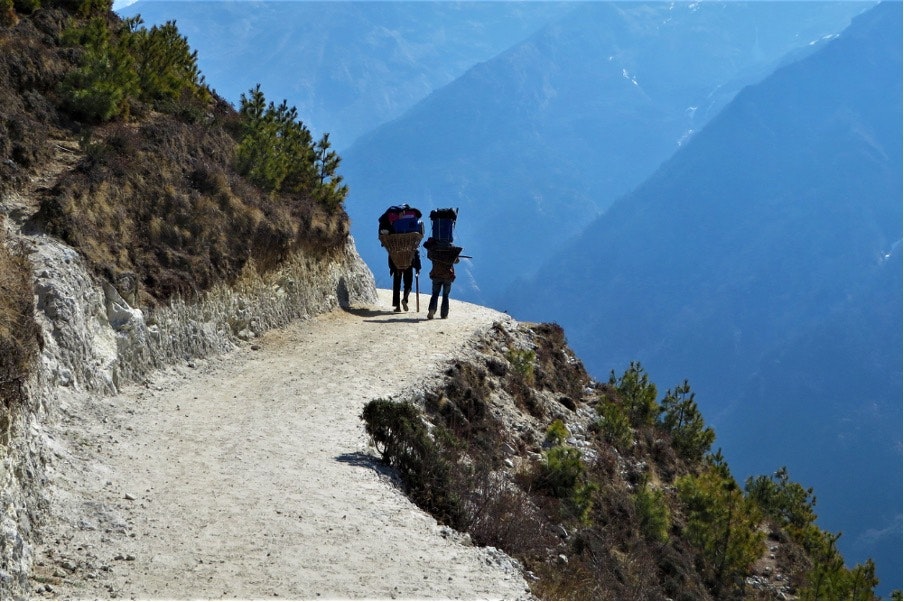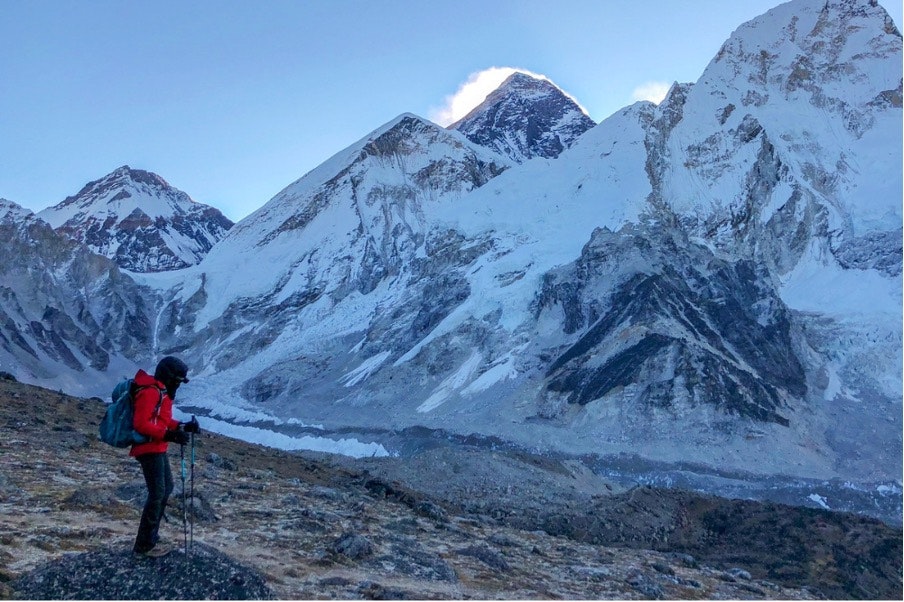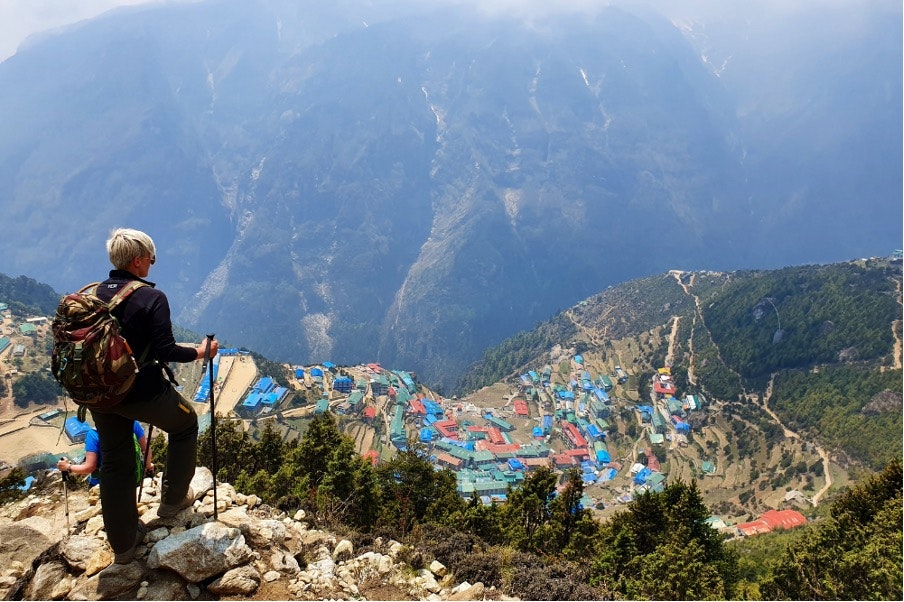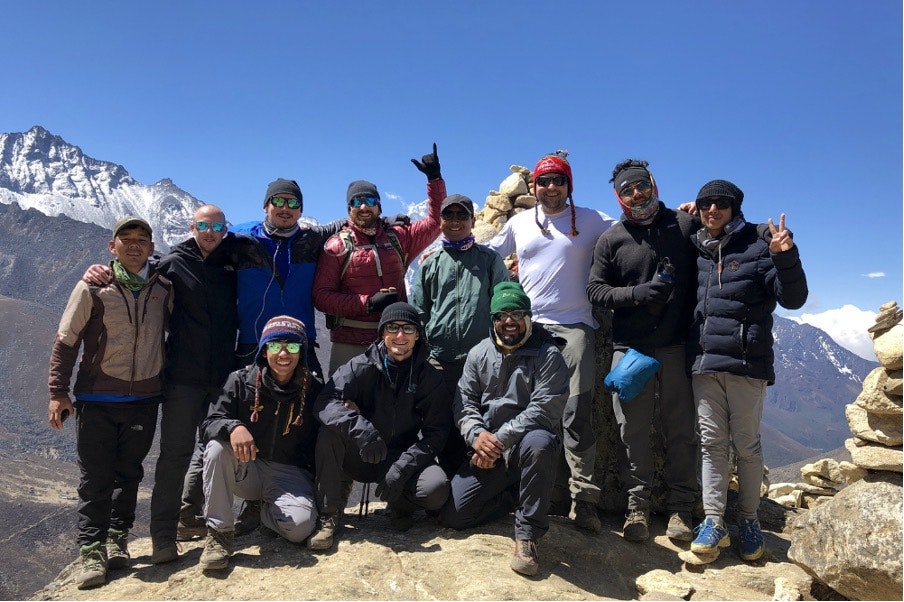Best Time to Trek Everest Base Camp: When To Go And Why
Check out our 15 Day EBC Trek itinerary!

Best Time For Everest Base Camp Trek: Spring & Autumn
What To Expect:
Clear skies: These months offer clear skies and excellent visibility, perfect for those panoramic mountain views.
Mild temperatures: Daytime temperatures range from 10 to 20 degrees Celsius, making the trek relatively comfortable.
Rhododendron blooms: If you trek during the spring, you’ll be treated to the sight of blooming rhododendrons.
Rainfall: Minimal rainfall, especially in the pre-monsoon months of March-May. Trails are easier to navigate during this time.
Temperatures: Daytime temperatures can range from 10 to 20 degrees Celsius, while nights can get chilly, dropping to around 0 degrees.
Winds: Winds are generally moderate but can get stronger as you ascend. They may pose little of a challenge.
Snow: Snowfall is less likely but can occur at higher altitudes.
Crowds: These are the most popular months, so expect more trekkers on the trail.
Higher costs: Due to the demand, prices for guides, porters, and accommodations can be higher.
Vibrant atmosphere: The trails buzz with energy, and there’s a sense of camaraderie among trekkers.
Networking: You’ll meet people from all over the world, sharing stories and perhaps making lifelong friends.
Busy trails: Expect congestion, especially at popular viewpoints and narrow sections of the trail.
Accommodation: Teahouses and lodges fill up quickly, so advance booking is recommended.

What Seasons to Avoid: Summer & Winter
Reasons to Avoid Everest Base Camp Trek During Winter and Monsoon Seasons
Dangerous Trails: Monsoon rains make trails slippery and prone to landslides, while winter snow adds extra difficulty.
Extreme Temperatures: Winter temperatures can plummet to -20°C at higher altitudes, posing severe risks.
Strong Winds: Icy winds in winter make trekking even more challenging.
Reduced Visibility: Expect clouds and mist to obstruct mountain views in both seasons.
Limited Services: Many teahouses and lodges close, especially during winter.
Isolation: While quieter trails may appeal to some, the lack of buzz and support can be a downside.

Why Timing Matters

The Right Time Makes the Challenges You’ll Face Easier to Deal With
Altitude sickness: As you ascend, the oxygen levels decrease, making Acute Mountain Sickness (AMS) a genuine concern. Recognizing symptoms like headaches, dizziness, and nausea is crucial.
Weather conditions: The Everest region’s weather can be unpredictable, affecting visibility and trail conditions. Spring and Autumn offer the most stable weather during the year, making it a great time for this trek.
Physical demands: The trek involves steep ascents and icy terrains, requiring good physical fitness.
Logistics: Obtaining necessary permits, EBC insurance, and managing logistics can be challenging but are essential for a successful trek.

Your Well-Deserved Rewards
Unparalleled scenery: From the vibrant Namche Bazaar to the spiritual haven of Tengboche, the trek offers stunning views of the Himalayas. During winter and summer, these views are often obscured, robbing you of a once-in-a-lifetime reward.
Cultural immersion: The trek provides opportunities to engage with the local Sherpa culture and even visit Everest Base Camp tea houses, adding a rich layer to the experience.
Sense of accomplishment: Reaching Everest Base Camp is a monumental achievement that offers a profound sense of accomplishment.

Conclusion
More EBC Articles
Find your next adventure
Why Skyhook?
Join over 27,000 Skyhook adventurers who've used our platform to book directly with our vetted local guides, at local prices (we never markup).
Expert Local Guides
Experienced local guides, handpicked by us.
Best Prices
Never pay a markup on the local guide's price.
Exclusive Club
Earn loyalty rewards every time you travel.
Great Social Vibes
Small group tours provide a richer experience.
Stellar Feedback
Over 3,000 reviews, average of 4.9/5 stars.








